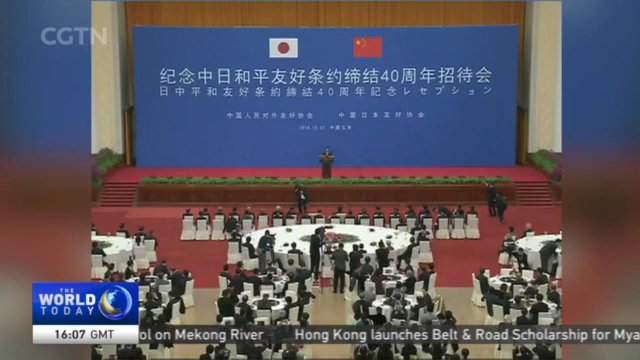
09:31, 27-Oct-2018
China-Japan Relations: Treating each other as partners rather than competitors
Updated
08:48, 30-Oct-2018
03:33

To treat each other as cooperation partners rather than competitors. This is what China and Japan agreed following talks between Chinese Premier Li Keqiang and his Japanese counterpart Shinzo Abe. The bilateral relationship is now at a historic turning point. So how is Japanese society reacting to this visit? Our correspondent Terrence Terashima tells more from Tokyo.
Prime Minister Shinzo Abe's visit to Beijing, has been a long time in the making and the Japanese public is paying close attention. Hopes in the country are high that Abe's trip can usher in a new era for Sino-Japanese relations, among politicians, the business community and society at large.
LI KEQIANG CHINESE PREMIER "China is willing to further strengthen its positive interaction with Japan, learn from history and face forward towards the future, and mutually promoting policies based on coordination and cooperation. That is our fundamental policy, to sustainably improve our relationship."
After all, China plays an essential role in the future of Japan's economy and national security.
"I think we should increase exchanges at all levels, so we can have better understanding of each other and strengthen the bilateral relationship."
KEN JIMBO, PROFESSOR FACULTY OF POLICY MANAGEMENT, KEIO UNIVERSITY "Basically what drives this relationship is basically lead by probably the economy, I think that Japan certainly need to invest more in wider Eurasian continent and the Indo-Pacific region. There china has been investing massively on the infrastructures and the digital platform and so forth."
Abe is accompanied by a 500-member business delegation – an indication of Japan's appetite for joint investment opportunities with China, under the framework of the Belt & Road Initiative. The neighbors will be looking to promote projects that are both transparent and effective.
With strong trade pressures from Washington, Japan's business sector is keen to expand with China in the Indo-Pacific region. They'll aim to safeguard multilateralism and free trade, with the hope that one can act as a catalyst for the other.
TERRENCE TERASHIMA TOKYO "The 40th anniversary of peace and friendship treaty is a very good opportunity for Shinzo Abe to leave a mark. That he was the one that brought Sino-Japanese tunes back on track after years of strained relations since the previous administrations."
The prospect of closer ties has received a warm welcome from the Japanese public. Whether its the easing of regional military tensions, increased maritime security or the hope of achieving denuclearization on the Korean Peninsula, the fruits of a closer friendship between the countries are a source of optimism for many.
SHINZO ABE JAPANESE PRIME MINISTER "The denuclearization of the DPRK is a common goal of both countries. We agreed to continue to closely coordinate and deal with the issue, and properly fulfill our responsibilities. I am also determined to join hands with the international community to resolve the issues of abduction, nuclear weapons, and missiles of the DPRK, settle the unfortunate past, and normalize diplomatic relations with the DPRK."
Some, however, are cautioning that this is only the beginning and that realizing a truly win-win relationship between the economic powerhouses, will take a lot more dialogue going forward. Terrence Terashima, CGTN, Tokyo.

SITEMAP
Copyright © 2018 CGTN. Beijing ICP prepared NO.16065310-3
Copyright © 2018 CGTN. Beijing ICP prepared NO.16065310-3